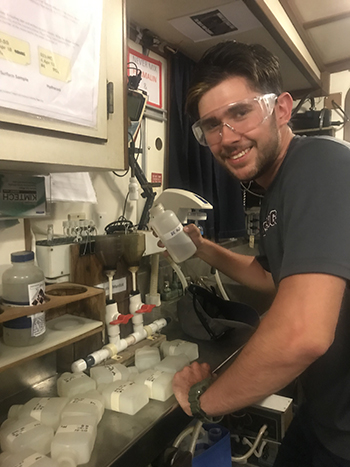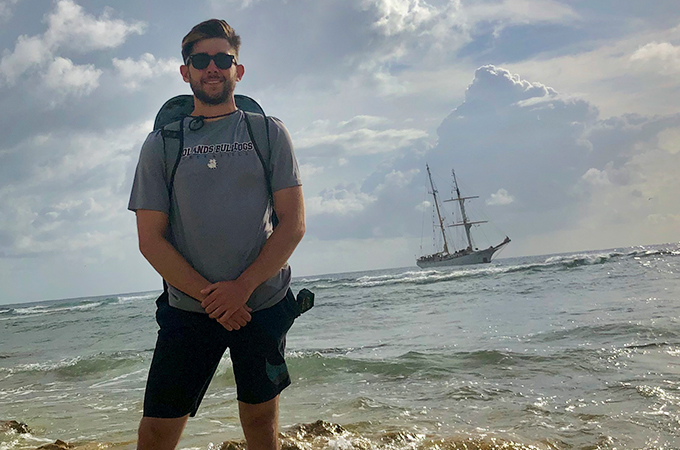When asked what he did over the summer, University of Redlands alumnus Jason Gonsalves ’19 has an unusual answer: conducting research in the middle of the Pacific Ocean.
After graduating with a degree in physics last April, Gonsalves embarked on a summer program with Sea Education Association (SEA) that took him to the Phoenix Islands, a remote group of eight islands of coral. He was one of a select group from a diverse range of colleges and universities who conducted this research to assist in the ongoing development of an effective conservation plan for the region.
“At the U of R, I was originally lined up to focus on astrophysics, but switched to marine science,” he says. “I was looking for experience in the field. I’ve always been interested in sailing, so this seemed like a great opportunity.”
Through an eight-week program called Protecting the Phoenix Islands, students collected samples from the marine environment to assess the effects of climate change, including coral bleaching. This real-time data provided information on the state of the ocean for the benefit of the Phoenix Islands Protected Area management office in Kiribati.
The program began June 10 at SEA Semester’s campus in Woods Hole, Massachusetts, where the students completed preparatory coursework and developed their own research projects in ocean science and conservation policy.
The first week in July, the class began a five-week sailing voyage as active crewmembers and scientists aboard SEA’s 134-foot brigantine SSV Robert C. Seamans.

For the duration of the trip, groups of seven or eight students took turns keeping watch, maintaining the sails, checking the engines, cleaning, and steering in six-hour shifts. Gonsalves’s first shift was from 1 to 7 a.m. and then rotated from morning to night shifts for the rest of the trip. He says he learned a lot about maintaining a boat during these hours.
From Pago Pago, American Samoa, the group sailed approximately 3,143 nautical miles across open ocean to the Phoenix Islands Protected Area to conduct three weeks of research. The expedition landed back in American Samoa on August 12.
Gonsalves says that the trip’s oceanographic research and free time produced a number of highlights, but meeting the people on the island of Kanton stands out: “The population of the island is around 60 people, and about 20 of them are kids from the ages of 4 to 14. Getting to spend time with them, playing soccer, talking about their aspirations, and seeing their desire to explore the world, was amazing.”
According to SEA Dean Paul Joyce, “The Phoenix Islands Protected Area is one very few regions on Earth where scientists can study an intact ecosystem and its response to climate change. At SEA, we’re therefore extremely grateful to have the opportunity once again to work with the government of Kiribati and with our scientific partners to study this extremely isolated and important island nation, which can serve as a climate change benchmark on a global scale.”
Gonsalves is looking forward to applying to graduate school while savoring his recent experience. “I’m glad I took a gap year between undergraduate and graduate school,” he says. “Learning how physics ties into oceanography was a great opportunity that will likely help me in my future career as a scientist.”
Learn more about studying physics and other subjects as an undergraduate at the University of Redlands.






